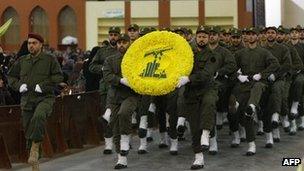US sues Lebanese firms for 'laundering Hezbollah funds'
- Published

Hezbollah is designated as a terrorist group by the US authorities
Three Lebanese financial institutions linked to Hezbollah laundered more than $300m (£193m) through the US second-hand car market, US prosecutors say.
A civil suit says the Lebanese Canadian Bank and two money-exchange firms used drug-trafficking and criminal proceeds to buy and ship cars to West Africa.
Cash from their sale was allegedly then smuggled to Lebanon, along with funds from Colombian and Mexican cartels.
Prosecutors are seeking $480m in penalties from the three institutions.
They say this represents the total amount of money laundered.
Prosecutors are also seeking to freeze and seize the assets of the companies, along with those of about 30 US car dealers and a US shipping company, which are accused of facilitating the crime.
Hezbollah, a Shia Islamist movement, was designated as a foreign terrorist organisation by the US government in 1997.
'Intricate scheme'
The civil suit filed at Manhattan federal court, external on Thursday alleges that between January 2007 and early 2011 at least $329m of drug-trafficking and criminal proceeds was wired from Lebanon to the US to buy second-hand cars, which were then transported to West Africa.
"Cash from the sale of the cars, along with the proceeds of drug-trafficking, were then funnelled to Lebanon through Hezbollah-controlled money-laundering channels," the US Attorney's Office said.
Couriers, smugglers and currency brokers brought the cash to two money-exchange companies in Beirut - the Hassan Ayash Exchange Company and Ellissa Holding - which then deposited it at the Lebanese Canadian Bank, it added.
Prosecutors said the bank had allowed other Hezbollah-related entities to conduct massive transactions, sometimes worth as much as $260,000 per day, without disclosing the source or purpose of the money.
"Substantial portions of the cash were paid to Hezbollah," the US Attorney's Office said.
US Attorney Preet Bharara said the "intricate scheme" revealed the "deviously creative ways that terrorist organisations are funding themselves and moving their money, and it puts into stark relief the nexus between narcotics trafficking and terrorism".
"We are putting a stranglehold on a major source of that funding by disrupting a vast and far-flung network that spanned three continents."
In February, the Lebanese Canadian Bank merged with a subsidiary of Societe Generale after the US treasury designated it as a "primary money laundering concern", forbidding US institutions to deal with it.
A lawyer for the Lebanese Canadian Bank's former owners has denied any wrongdoing, as have the money-exchange companies.
Hezbollah has dismissed the charges as American propaganda.
The suit was filed two days after a Lebanese man linked to Hezbollah, Ayman Joumaa, was indicted in Virginia on charges of conspiracy to distribute narcotics and commit money-laundering related to trafficking by Mexican and Colombian cartels. His whereabouts are unknown.